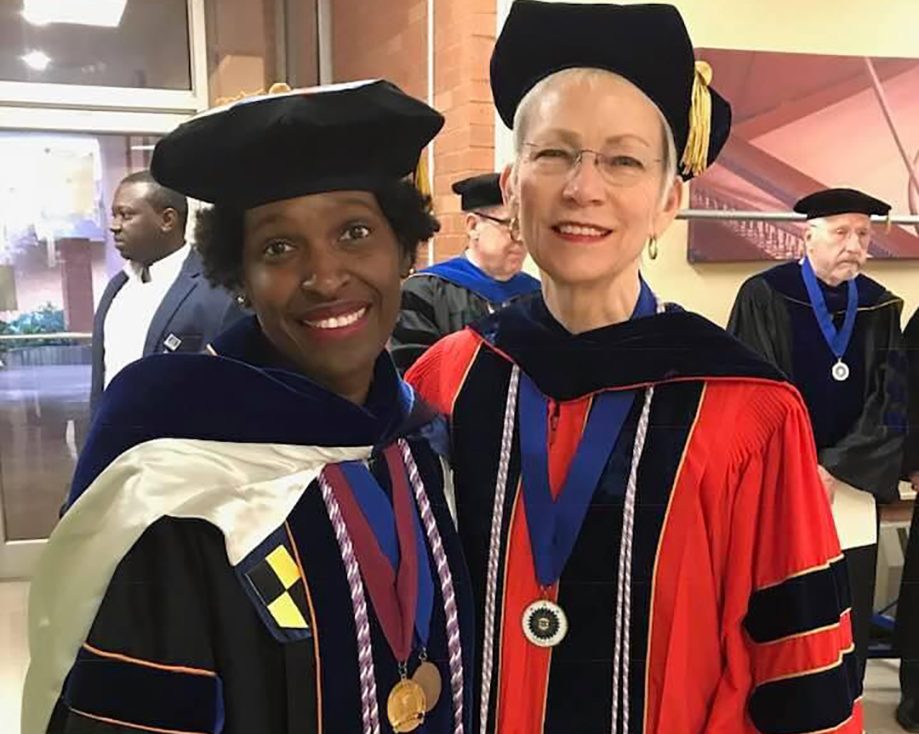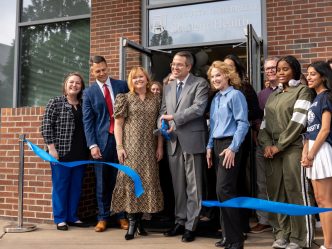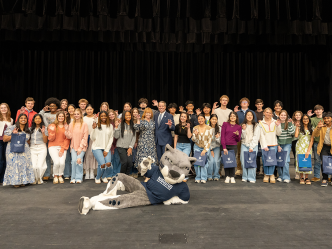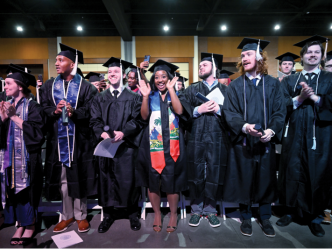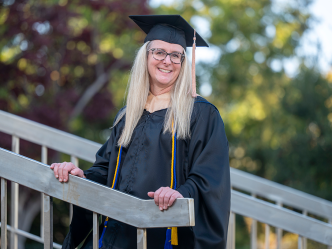Lovoria B. Williams, PhD, knew from an early age she wanted to pursue nursing as a career.
She knew the ability to make a difference serving in someone’s life was important to her, but over time health disparities and inequities piqued her interest in performing interventions in the community that make a difference in people’s health outcomes.
The double Jaguar graduate is currently a professor in the College of Nursing and Graduate Studies at the University of Kentucky, the director of the Community Health Advocacy iNterventions Generating Equity (CHANGE) team and the associate director of Cancer Health Equity, Diversity and Inclusion at the NCI-designated comprehensive Markey Cancer Center, where she also holds the position of endowed Research Professorship in Cancer Health Equity.
Williams is also an active family nurse practitioner, who promotes tobacco prevention behaviors through her practice as a tobacco treatment specialist while integrating student teaching and research into her role.
“Without a doubt, the nursing profession has aligned well with my passions, gifts and love for people,” Williams said. “Nursing has positioned me to deliver holistic patient care, impact the careers of students and advance health equity among disparate populations.”
“Not only is she an esteemed and accomplished nurse scientist, but during her time in the Augusta community, she was a dedicated family nurse practitioner and cared for individuals with chronic health issues across the community.”
Beth NeSmith, PhD, dean of AU’s College of Nursing
Equipped with education
Originally from Hopkinsville, Kentucky, Williams moved to Augusta from Germany after her husband, who was serving in the United States Army at the time, was transferred to Fort Eisenhower, then known as Fort Gordon.
She remembers the culture shock, but over time the family fell in love with the people and the community that quickly turned into home.
By the time her husband was ready to retire from the military, the family was so embedded within the community and their church that there were no plans to move.
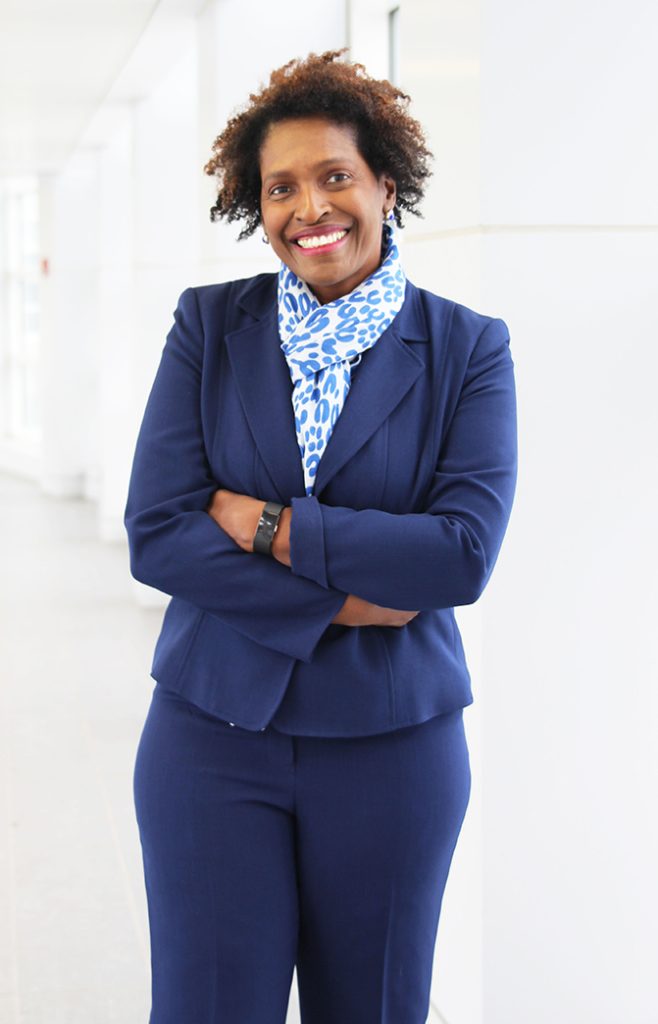
Williams was already a registered nurse working at then-University Hospital (now Piedmont Augusta) when she decided to pursue her Bachelor of Science in Nursing from the Medical College of Georgia. She graduated from the program in 1994.
Two years later, she graduated with a Master of Science in Nursing from Georgia Southern University while transitioning to a family nurse practitioner position. She said achieving higher education wasn’t always her plan.
“I remember sitting there watching doctorates receive their degrees and saying to myself, ‘I’m never doing that. I’m done,’” said Williams. “But then I engaged in full-time practice at the VA Medical Center Uptown Primary Care Division and what I saw over my 11 years there is that I would have patients who would be pre-diabetic when I met them, and then I was there long enough to see them convert to Type 2 diabetes and eventually diagnose them with colon cancer. It reached the point where I wanted to learn more about how to develop effective behavioral change interventions so we could prevent these poor health outcomes.
“That’s what really inspired me to go back for my PhD,” she said. “To be able to help someone change their behaviors to prevent disease was more inspiring to me than simply treating chronic illness.”
She earned her PhD in Nursing with distinction from Augusta University in 2011.
“Coming back for the PhD program, I found that I needed to think more broadly, be more independent in my thought and know what area I wanted to focus my science,” Williams said. “When I graduated, there was a big desire for me to continue the research that I had started as a PhD student and continue my faculty role.”
Value of research
Williams’ current research aims to advance health equity among racial/ethnic minorities and underserved populations through community-engaged research methods to affect improved diabetes, cardiovascular disease and cancer outcomes.
She is nationally recognized for developing culturally-adapted interventions for implementation by community health workers in church settings. During her two decades in Augusta, she collaborated with the College of Nursing and the Georgia Cancer Center, building organic relationships and forming trust within the Augusta community.
“I had already started to build those relationships through ministry. I was the health ministry director at my church and then the health ministry director for the state of Georgia,” she said. “I was working with all these churches across the state, and, when it came to the research, they already trusted me.”
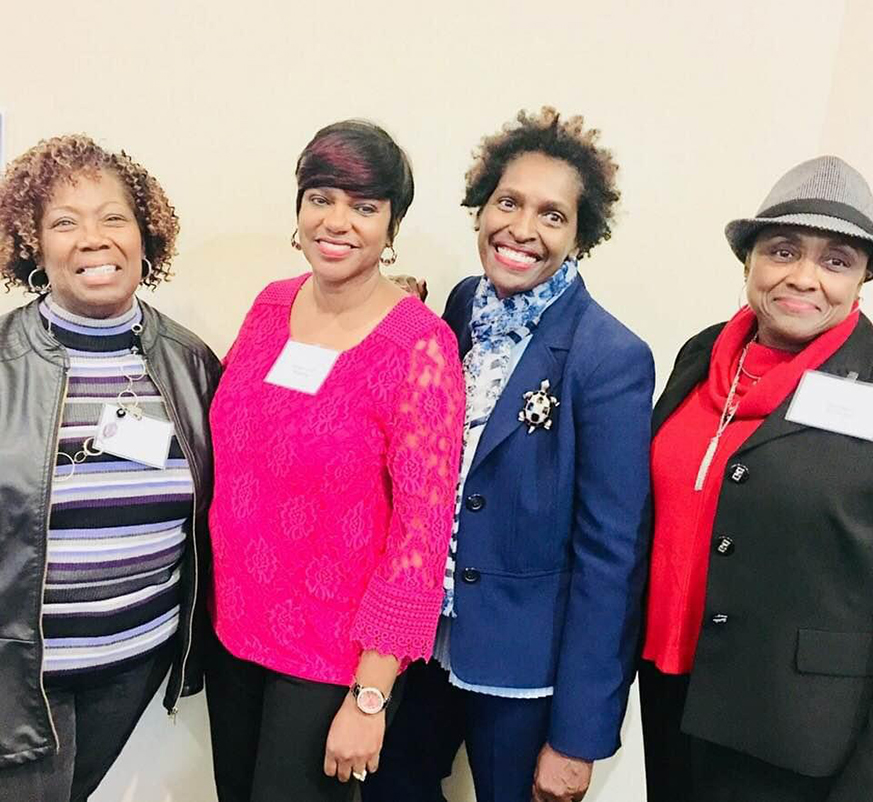
Williams said having those relationships was key because, without that trust, the community-engaged and clinical research didn’t hold much value if the participants didn’t believe that the results were going to impact them in a positive manner.
“Build those relationships through service first and then begin to work with them to improve their health outcomes, because if they don’t believe that you are there for them, they’re not as willing to work with you, and they won’t work with you,” she said.
While she believes not everyone has to be a researcher, she does believe that practicing clinicians should be aware of new science because it impacts how treatments are performed.
“Without a doubt, the nursing profession has aligned well with my passions, gifts and love for people. Nursing has positioned me to deliver holistic patient care, impact the careers of students and advance health equity among disparate populations.”
Lovoria B. Williams, PhD
Creating a new program
When Williams was an assistant professor at AU, one of the associate deans at the College of Nursing asked her to co-lead the Robert Wood Johnson New Careers in Nursing Scholars Program, including a grant that would increase the diversity and retention of graduate nursing students.
She took that experience and developed a similar program for underrepresented, early-career scientists at the University of Kentucky and also created a leadership development program for early-career faculty who are interested in cancer center leadership at the cancer center.
“That graduate-level career development program I was initially reluctant to lead at AU gave me the skill set to develop legacy programs at Kentucky that will shape the careers of future health equity-focused scientists and cancer center leaders,” Williams said.
College of Nursing Dean Beth NeSmith, PhD, said Williams has always been very passionate about health care outcomes and was driven and focused to improve those outcomes for underserved individuals.
“Not only is she an esteemed and accomplished nurse scientist, but during her time in the Augusta community, she was a dedicated family nurse practitioner and cared for individuals with chronic health issues across the community,” NeSmith said. “We are filled with pride that she holds AU so close to her heart and that she has found success in her current role. We are proud that our PhD program and our BSN program helped train and prepare this internationally recognized nurse scientist and clinician.”
Carrying the Jaguar banner
Starting with her first BSN class to her time as director of Diversity and Inclusion with the College of Nursing, Williams’ experiences at AU have stayed with her. She has loved being an educator and helping her students get valuable hands-on experience honing their skills.
“Everything we do, whether it’s at the bedside in the hospital or with our research, it all goes back to patient outcomes. Everything we do in our profession should drive patient outcomes for the better,” she said.
Williams is grateful to be considered a mentor to some and remembers hers – Janie Heath, PhD, Jeannette Andrews, PhD, and the late Lucy Marion, PhD – fondly.
The one thing she holds most dear is learning how to be a faculty member. She said AU has always had a strong tripartite mission – service, research and teaching – and she has taken that everywhere she goes.
“I’ve never been the nurse scientist who desires solely to conduct my research and not teach or mentor or not do community outreach or serve the college and the university,” Williams said. “I think Augusta really taught me how to be a good faculty member, one who gives back and contributes to the holistic mission of the university and the community.”
 Augusta University
Augusta University
